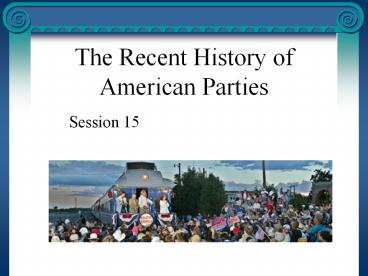The Recent History of American Parties - PowerPoint PPT Presentation
1 / 13
Title:
The Recent History of American Parties
Description:
Campaign Professionals Public Relations, Political Consultants, Advertising, ... Campaign Finance Federal Election Campaign Act ... – PowerPoint PPT presentation
Number of Views:49
Avg rating:3.0/5.0
Title: The Recent History of American Parties
1
The Recent History of American Parties
- Session 15
2
Parties Decline and Individual Candidates Become
More Important
- Party-Centered Campaigns to Candidate-Centered
Campaigns Why? - Legal 1) Progressive Era reforms the direct
primary for congressional candidates, civil
service instead of patronage 2) congressional
districts that are not consistent with party
organizations (1960s)
3
- Demographic education, mobility, decline in
immigration - Technological
- Media people got their information from media
and not parties - Campaign Professionals Public Relations,
Political Consultants, Advertising, Direct Mail
these professionals made the party apparatus less
necessary
4
- Party Reform
- Changes in the presidential nomination process
McGovern-Fraser Commission - Amateurs play a larger role and care more about
candidates and issues than winning - Campaign Finance Federal Election Campaign Act
- State and local party participation becomes
unwelcome - PACs, Contribution Limits
5
Consequences of Weakened Parties
- Less able to structure the choices that the
public was offered - Less useful in providing information that helped
voters make their choices - Less able to develop party unity among elected
officials because the elected officials because
the party was not responsible for success
6
National Party Organization Resurgence
- Decline Gradual, and at the local level
- Resurgence Rapid, and centered in the national
parties in DC - Incumbents thrive in a candidate-centered process
but other candidates do not. Parties realized
candidates need access to technical expertise,
political information, money, and other
resources. - Crises motivate change
7
Parties in Decline?
- A new form of party has emerged, one that is in
service to its ambitious politicians but not in
control of them as the mass party of the past
sought to be. - John Aldrich
- Why Parties
8
Electoral crises required a response . . .
- Republicans
- Watergate 1974, 1976
- Democrats Two Stages
- Phase I the changes in the nomination process
- 1968 Convention contributed to decline but also
to resurgence - Phase II the defeat in 1980
- 1980 Loss in presidential election
I dont belong to an organized political party.
Im a Democrat. Will Rogers
9
Institutionalized National Parties
Organizational Strength
- Finances
- Hard Money Contributions
- Soft Money
- Infrastructure
- Staff
- Consultants
- Interest Groups
- Party Building at the State and Local Level
10
Institutionalized National Parties
11
Soft Money Contributors and Party Organizations
- DCCCs Speakers Club
- DSCCs Leadership Council
- NRCCs Congressional Leadership Council
- NRSCs Senate Trust Club
12
National Party Campaigning
- Candidate Recruitment and Nomination
- The General Election Presidential Campaigns
- The General Election Congressional Races
- National Agenda Setting
- Fundraising in Campaigns Party-Connected
Contributions
13
National Party Campaigning (continued)
- Targeting the Contributions Maximizing Gains in
Seats - Leadership PACs
- Campaign Services
- Campaign Management
- Gauging Public Opinion
- Opposition Research































